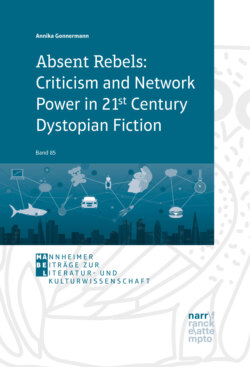Читать книгу Absent Rebels: Criticism and Network Power in 21st Century Dystopian Fiction - Annika Gonnermann - Страница 13
На сайте Литреса книга снята с продажи.
3.2. Contemporary Dystopian Fiction, Neoliberal Capitalism, and ‘Immanent Criticism’
ОглавлениеWe can’t pluck up this ‘Sardinian’ from his specific unique political formation, beam him down at the end of the twentieth century and ask him to solve our problems for us. (Stuart Hall on Antonio Gramsci and his influence 161)
Tom Moylan was among the first to diagnose a shift in focus in dystopian fiction towards a new target of criticism. He argues that “in the dystopian turn of the closing decades of the twentieth century, the power of the authoritarian states gives way to the more pervasive tyranny of the corporation. […] [Now] the corporation rules, and does so ever more efficiently than any state” (“Moment” 135f.). A similar claim is brought forth in Dystopia: A Natural History (2016) by Gregory Claeys: “the spectre of totalitarian despotism dies out as the central target of dystopia by the 1980s. Taking its place, commonly, is corporate dictatorship in various guises, with the privatization, marketization and monetization of all available resources, to the benefit of the wealthy” (495). What Moylan and Claeys try to capture in their reference to the corporation is a move away from totalitarian state domination to an all-encompassing market logic as it can be found in neoliberal capitalism.1 In order to understand the generic changes the two scholars describe, which some novels of the dystopian genre are currently subject to, it is vital to look further afield. Having established external criticism as the modus operandi of classical dystopian fiction, the following chapter will demonstrate that some contemporary novels seem to stand in the tradition of critical utopia and to work only through the lens of immanent criticism. Since this shift is a complex phenomenon and requires a broad theoretical foundation, it is thus necessary to shed light on the socio-political reality of the 21st century and its defining actors on a global stage (neoliberalism and globalisation), before attempting to show how these changes have started to affect dystopian fiction. Therefore, this chapter will first define the concept of neoliberalism and trace its influence on all levels of human life, before showing how this economic system has successfully colonised the realm of the possible, i.e. how we have come to think of neoliberal capitalism as the natural state of life. Drawing on the notions of Slavoj Žižek, Fredric Jameson, and Mark Fisher, this chapter will continue by explaining in detail why external criticism is not a suitable platform from which to criticise a social formation such as neoliberalism. Finally, this chapter will present the theoretical framework necessary to formulate immanent criticism in the first place, introducing David Grewal’s notion of ‘network power’ as one possible theoretical lens before continuing with the analysis of five informative and illustrative examples of contemporary dystopian fiction, which offer a critical reading of neoliberal capitalism.2
